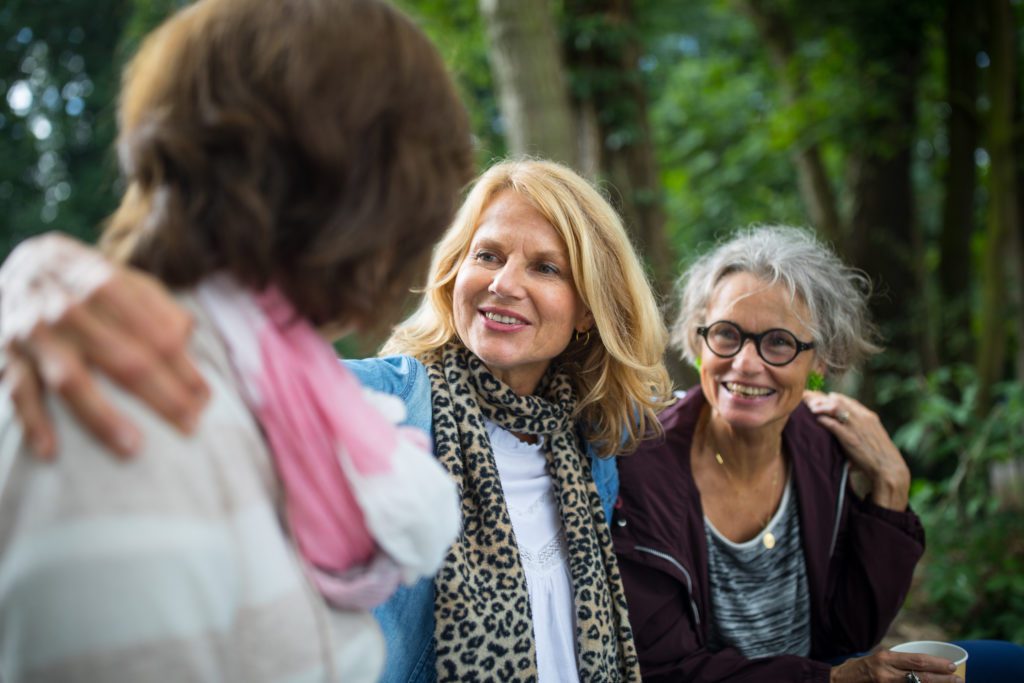The Strength to be Vulnerable
The image that often brings warmth to each of us is that of a brand new baby being held in the loving arms of a proud parent. The need to be held by loving arms continues as a child matures into adulthood.
The Need to Connect
“This need to be held and to be soothed while staying in the loving arms of another goes from the cradle to the grave,” writes Dr. Sue Johnson, therapist and author of Hold Me Tight. “Like a baby, we are all born with this vulnerability that does not go away. One of the real issues of your most meaningful love relationships is how you deal with this kind of vulnerability. Do you deal with your vulnerability in a way that helps you pull people close or push people away? We need to feel precious to another all through our lives.”
Contrary to popular belief, it is possible to be very connected and yet continue to maintain your own individuality. This type of love and security is a source of strength for people throughout their lives.

Johnson continues, “One of the most distressing things for me as a therapist is when I ask a client, ‘Could you imagine asking your partner for the deep reassurance that you need?’ He or she responds, ‘No I couldn’t do that because I am not supposed to feel that way. That means I am not acting like an adult, that I am immature, weak, and have some kind of problem.’ Based on the latest research, this statement could not be further from the truth. How in the world are we to connect with the person we love if we can’t talk about what we need?”
Whether it is out loud or only an inner voice, children and adults alike are constantly asking questions like:
- Do you love me?
- Are you accessible to me?
- Do I matter?
- Will you come when I call?
- Am I valued and accepted by you?
For years people have tried to understand the logic behind love. But what many may have forgotten is that love is all about emotion. Instead of trying to understand the emotional aspect of love, researchers have seen it as problematic in relationships.
“I think we can really understand the logic behind love,” says Dr. Johnson. “It truly is all about emotion, and sometimes I think we’ve lost that very simple fact. The signals sent to our partner make the difference in being able to pull that partner close and have a loving, lasting relationship, or, somehow in spite of our best efforts, making it hard for them to come close.”
For example, Joe and Karen have been married for seven years. Karen desperately wants to connect with Joe. Lately some trust issues have surfaced. Karen has started complaining and questioning Joe all the time. His response is, “I don’t know what you want from me. I have told you everything. I honestly don’t get it.” Joe leaves the house thinking he can never be good enough, nor can he ever measure up to her expectations. Karen on the other hand is questioning if he loves and values her.
These two people really do want to connect. Her way of connecting is for her husband to prove that he still loves her. Karen wants Joe to prove that she can still trust him and that he is committed to her. He, on the other hand, wants Karen’s approval. Joe wants to share the good and the bad without fear of being attacked. He needs her to love him whether he messes up or not. He feels smothered and does not believe there is anything he can do to make her trust him.
Dr. Johnson believes we should think of this as the biggest treasure hunt in human history – learning how to understand this incredibly powerful emotional bond that is either a great source of joy and strength in our lives or for many a most incredible source of pain.
Joe and Karen find themselves in a vicious cycle that many other adults are dealing with in their marriage relationships. Neither one of them recognizes the often hidden issues like power, recognition, acceptance, integrity, control, and caring/commitment that come into play when seeking emotional connectedness. These hidden issues create huge problems for couples in understanding one another and in making a connection.
Being Everything to Someone
The majority of people responding to a 2006 National Science Foundation Survey stated that the number of confidants in their inner circle was shrinking. Additionally, a growing number stated that they had no one in whom they could confide.
“Robert Putnam, in his book, Bowling Alone, writes that we are seeing people living in couple relationships as a community of two,” says Dr. Johnson. “We turn to our love relationships now for what my grandmother had an entire village to help her deal with. This puts enormous pressure on the spouse to meet all these emotional needs. Emotional isolation is more the order of the day. We are building societies in a way that has nothing to do with the way we are wired.
Common Factor of Isolation
In the 1980s experts projected that by the ‘90s people would be cocooning in their homes. In the midst of the 21st century we are dealing with individualized entertainment like computers, and iPods that allow people to cocoon within their cocoon. Instead of couples sitting together and talking, watching a movie or television show, they’re on their Blackberry or computer doing their own thing somewhere by themselves. There is an emptiness created by the absence of neighborhood gatherings, church socials, family meals, and other events that promote opportunities for emotional connection among human beings.
The Value of Emotional Connections
Over time society has sent the message that there is something wrong with needing other people. Yet research shows that it is in our DNA to need someone to depend on, a lover, one who can offer reliable emotional comfort. Bonding emotionally is all about our innate need for safe emotional connection.
“The research is very clear,” explains Dr. Johnson. “The very best modeling you can do for your children is by having a great love relationship with your spouse. In doing so, your parenting skills and ability to connect with your children goes up exponentially. It is incredibly hard to do anything all by yourself because our brains aren’t wired for this.”
Healthy emotional connections also impact your physical health. Lewis Hawkly’s research on the heart shows that there is a strong relationship between physical health of the heart and levels of loneliness. Basically when you feel emotionally alone, your blood pressure goes up to the point where the likelihood that you will have a stroke or heart attack doubles. Additionally, studies show that isolation is more devastating on the health of humans than smoking.
“A lady with terminal cancer was in my office with her husband,” Dr. Johnson reports. “Her husband said, ‘Maybe it isn’t so bad. You can beat this.’ After listening to her husband for a few minutes, she finally said, ‘Don’t you understand? I can handle dying. I can’t handle dying alone. Will you come and be with me? If you are with me, I can handle it.’ We need safe hands around us when we are born into this world and when we leave this world.”
Psychologist and researcher, John Bowlby, found this emotional connection to be as important as having oxygen. Studies conducted on people surviving the trauma of the 9/11 attacks showed that the people who have been able to reach out to other people and pull them in close are doing much better than the people who had no close connections. People are often not good at dealing with dragons alone.
Establishing Emotional Intimacy
If you find yourself in a relationship where you feel like there is no emotional intimacy, there is hope. Here are a few suggestions for establishing or re-establishing emotional connectedness in marriage:
- Put down the electronics – While most consider them a blessing, they can actually be a curse when it comes to emotional intimacy in your marriage. Put away your cell phone and iPod and computers. All this individualized entertainment is a hindrance to connecting.
- Attend marriage enrichment classes that will help you turn your relationship around.
- Intentionally set time aside to be alone together to communicate about your lives, your feelings, and your deepest needs.
- Read a book like Hold Me Tight, Safe Haven, or Fighting for Your Marriage.
- Seek help from a marriage-friendly counselor.
- Don’t give up. Emotional connection takes time and a willingness from both people to take risks and responsibility for their part in reconnecting.
“Love is the greatest source of strength we have,” according to Dr. Johnson. “Sex, money and kids are what people say they fight about the most. What they are really fighting about is the desire to connect on a deeper level to manage some of these differences in a constructive manner. The drive to emotionally attach is as basic to life, health, and happiness as the drives for food, shelter or sex. We need emotional attachments with a few irreplaceable others to be physically and mentally healthy to survive.”
Establishing this emotional connectivity will enhance all our relationships, especially the most intimate ones. The power of valuing others and being valued by them is vital for the sake of our partners, our children, and ultimately our society.


Julie Baumgardner
Julie Baumgardner is the Executive Director of First Things First, a research and advocacy organization dedicated to strengthening families through education, collaboration, and mobilization. She can be reached at julieb@firstthings.org

